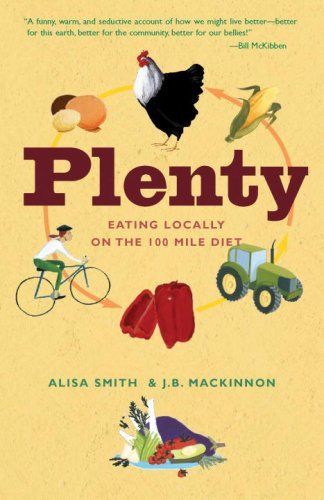
Reading an outstanding piece of literature on vegetarianism, was what made me abandon my carnivorous ways (thank you very much “Eating Animals”. My transition was seamless and complete.
THEN, I started reading appalling books on veganism (hello, “The Kind Diet”) and I banned dairy from my existence as well. That’s it, it’s final. My eating habits were set in stone and I was content.
Enter, the phrase everyone’s sick of-locavore.
Now, I’m a stickler for organic food. I don’t like consuming anything with pesticides in it and I will gladly shell out $7 a pint for USDA-approved strawberries during any season if I have to. But I prefer the idea of getting everything at my local farmer’s market for three very important reasons:
- The prices are significantly lower than Whole Foods, while getting the same quality produce.
- The open-air, spacious parking lot available to browse numerous booths is a lot more relaxing than battling other shopping carts down the narrow aisles of Trader Joe’s.
- I like forming even briefs relationships with the farmers who were growing my food, and I enjoy learning about the process behind it (farmer’s market attendees are VERY chatty.)
Unfortunately, living in New England means these wonderful markets are only around 6 months out of the year. So recently I’d been thinking about how far my food was traveling to get to my plate, when I was eating mangoes and bananas before I headed out to clean the frost of my car. Something didn’t seem right. It didn’t strike me as biologically, economically, sustainably and morally sound to be eating “organic” food that came from half way across the world and gobbled up insane amounts of fuel before it landed on the supermarket shelf. Could that even be considered fresh? Were organic blueberries for Christmas worth the huge carbon footprint?
“Plenty: Eating Locally on a 100-Mile Diet” tackles all these timely food issues that were plaguing my grocery habits. Published in 2008, this book could easily be pinned as the memoir that sparked this whole locavore trend. Written within a tumultuous year of triumphs and failures, a Canadian couple (Alisa Smith and JB McKinnon) tackle the implications of their seemingly perfect organic diet. They reminded me a lot of Jim and myself-she a mildly neurotic, smart-assed writer who acts completely on her wild emotions; he a calm, head-strong jack-of-all-trades who leads the way in their local expeditions. From foraging for wild herbs and mushrooms, to shucking dozens of ears of corn into the wee hours of a weekend to smuggling goods over the US border, they went to great lengths to maintain their promise to reduce their intake of food that needed a passport to get to their plates.
Amidst constant bickering over who could cook what, where their next meal could possibly come from and how they could possibly live a life without processed flour, comes a poignant story about what food really is. It is life, in its purest form. It’s going beyond throwing imported veggies into a plastic bag at Whole Foods. It’s recognizing where your meal came from, how it got there, and WHO got it there. The raw relationship in this book, amongst its main characters (sometimes driven to the brink of a break-up during an all-night tomato canning session) and between them and the people they bought their food from is what is so refreshing. The idea of knowing the individuals and the work that went into that strawberry jam, those new potatoes or a glorious homegrown wine. It’s not always pretty, but the work and effort that goes into make sure your food is in its purest, freshest state is an unparalleled reward that few get to experience.
And how does this even fit into vegetarianism, you might say? Alisa and JB WERE in fact meat-free up until their 100 mile diet. Not that this local diet would lead me back to carnivorism, but one can have respect for the fact that they chose to increase their meat intake, as organically fed, and humanely-raised animals were readily accessible in their neck of the woods. They went back to eating meat because it was raised the old-fashioned way, the way some of us envisioned our grandparents doing it. I do not support meat-eating, but if people are eating animals, THIS is the way it should be done. And I think the book overall, advocates for vegetarianism as it just makes sense that a local diet would automatically include mostly fruits and vegetables as almost every other food option is imported or processed somehow, and only produce remains untainted.
Real, clean food, regardless of the “organic” label is simple. It doesn’t need bragging rights, a high price tag or even many ingredients added to it to make a delicious meal. It is humble and is proof of hard, honest work. And more importantly it builds a sense of community through the local suppliers, buyers and cooks, all of whom help make the world a better place, one forkful at a time.






Leave a Comment...